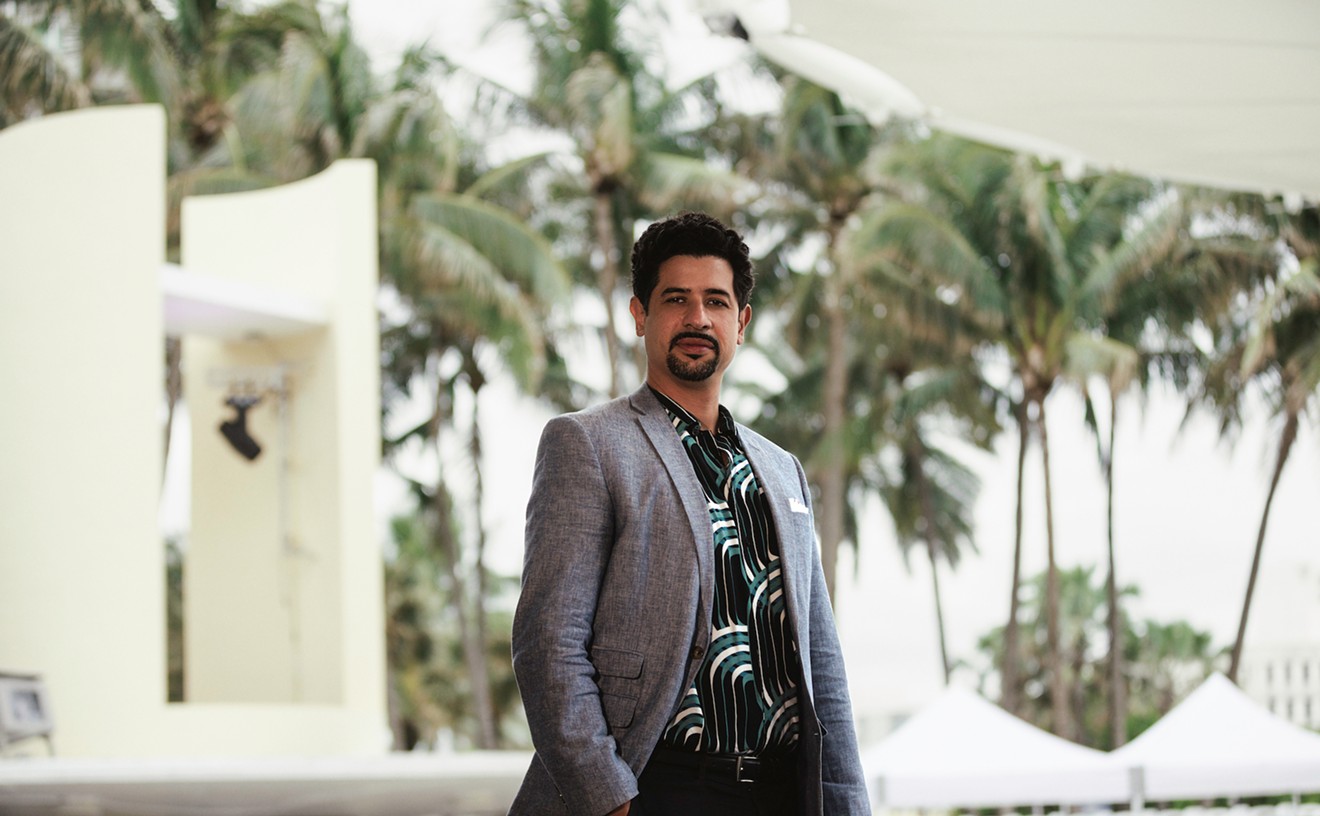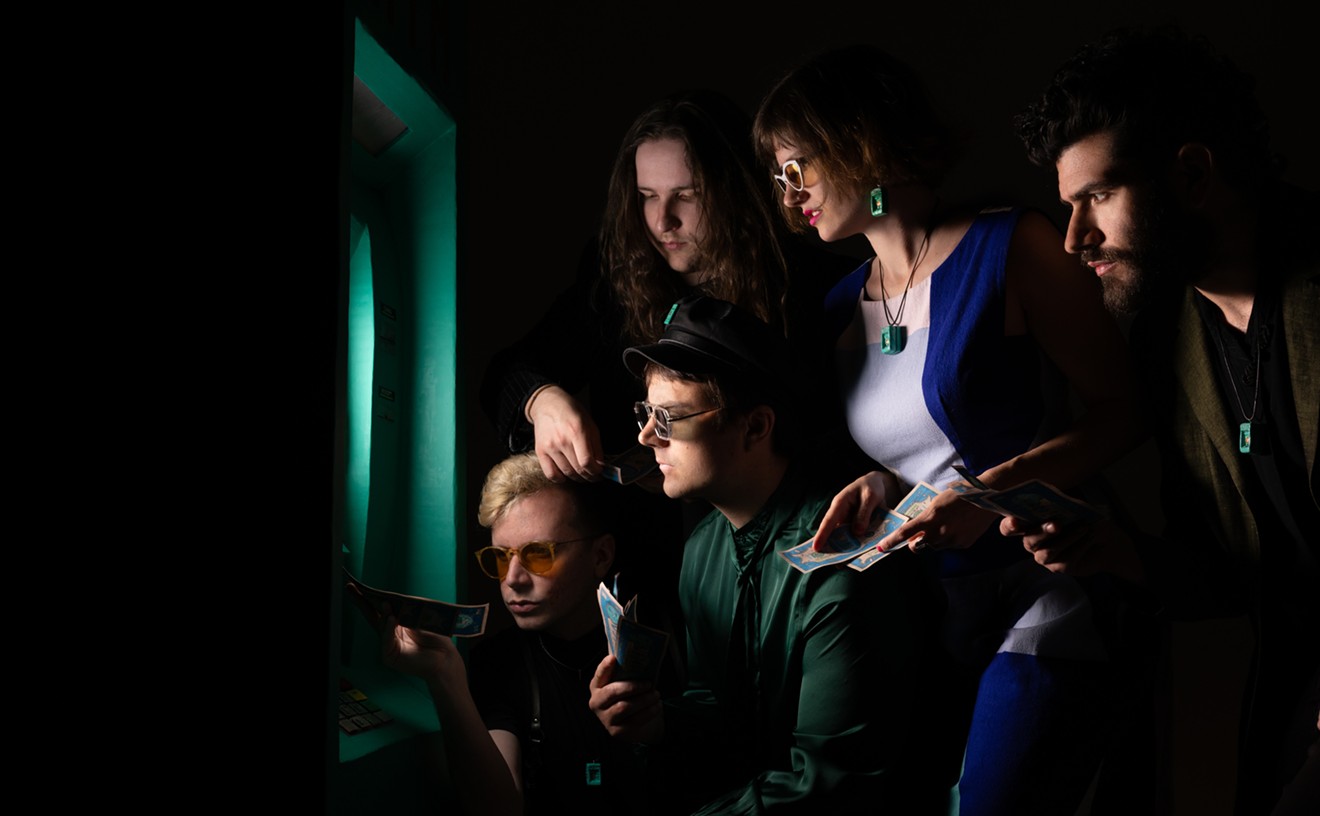"I'm originally from New Jersey, where a lot of house music originated in the late Eighties and Nineties," explains Williams, a computer consultant by day. "For about ten years I've had a strong interest in DJing and wanted to learn the art in its purest, organic form, with vinyl records. When I found Scratch DJ Academy online, I didn't care what I had to do to get here."
Williams chose Miami over the original New York Scratch Academy — the first school of its kind, founded in 2002 by Rob Principe and RUN DMC's late DJ, Jam Master Jay — because, she says, "I love how everywhere I go in Miami I hear some type of dance music!" Scratch expanded to L.A. in 2004, followed in 2005 by the Miami branch.
Regardless of where you attend, everyone begins with DJ 101. "That's our ömusic theory' course," explains DJ Immortal, a.k.a Jamie Keogh, a Scratch instructor who greets aspiring DJs at the school's storefront location, in a South Beach strip mall. Keogh, who looks every bit the Floridian with ponytail, facial hair, and board shorts, presides over a classroom that includes a dozen pairs of shiny turntables and a huge library of vinyl albums. "101 teaches about quarter, eighth, and sixteenth notes, how to count beats and bars," Keogh says. "Theory that applies to all music. Students learn some DJ terminology plus a little history of who invented what."
Mario Robles, age 21, who was drawn to the academy after attending raves in his native Brazil, has completed seven Scratch courses: five DJ classes plus two "beatmaking" courses, which utilize computers for digital sequencing and editing of students' original music. Robles recalls his days as a newbie in DJ 101. He and other students stood shoulder-to-shoulder before their turntables. "Most people want to learn mixing, for parties or clubs," he says. "But the classes for scratching were only half full."
To "scratch" is to play the turntable as an instrument unto itself: naked fingers push vinyl back and forth under the needle, creating rhythmic whooshing sounds. Scratch students initially learn by manipulating an instructive record — a kind of vinyl textbook. "Jamie showed us how to scratch to the beat, very slowly," Robles says. "First the baby scratch, the forward scratch, the back scratch. Then as we practiced, he'd walk around and correct us individually."
Later classes focus on creating perfect sets of songs, and marketing oneself as a DJ. There's also "beat juggling," the art of mixing the same record on both tables, looping pieces of the same song in different combinations, at different speeds, so as to create new rhythms and sometimes, new songs. Luckily, Miami students share classroom space with only six to twelve others (it's up to twice that many in L.A. or New York). "Everyone has their own headphones and their own speakers anyway," Robles says, "so you're not even bothered."
A curriculum for DJs might seem paradoxical. After all, they're a breed famous for partying and sleeping late — not taking pop quizzes. But the folks who run the Scratch Academy are dead serious about their pedagogy.
The faculty roster boasts big names like GrandWizzard Theodore, I.Emerge, and DJ Craze. But all of them — no matter how famous in the clubs — have to meet the Academy's standards. "Just because you're a good DJ doesn't mean you're a good teacher," stresses cofounder Principe. "New teachers guest teach until we're comfortable. We let teachers put their own spin on their class, but if they can't communicate our curriculum then they're not right for us."
Students pay anywhere from $80 to $400 per class. Principe insists that most of the academy's students sign up for classes because they love the music. But some of them do harbor dreams of using their skills to DJ professionally. Robles, for instance, purchased thousands of dollars' worth of DJ equipment and a catalogue of vinyl records, all to spin "hip-hop, and some happy hardcore" at home. But recently, he's been fielding offers to DJ at parties and boutiques, gigs he's had to turn down, he says, because he has a full-time job — as an airplane technician. As a Scratch alum, though, he's now contemplating making a go of it as a professional spinner. So is Nicole Williams, who goes by the handle DJ Kneeka. She plans to take every Scratch class, buy her own DJ equipment, then rent a club in North Carolina where she can spin.
All of this sort of begs the questions: Should DJs be bred like guppies? Shouldn't people figure out on their own how to DJ?
Principe dismisses this notion. He recalls that Jam Master Jay "used to always say öMan, I wish they'd have had a school like this when I was learning!'"
But if Jay had taken DJ classes, would he have become so innovative?
No one at Scratch Academy believes that teaching people the "right way" to DJ will hinder anyone's creative process. Principe — who estimates that his three academies have graduated some 5,000 students over the years — takes a broader view regarding his and his students' motives. "If it wasn't taught," he says, "there would be thousands of people less that got to experience music this way."
Principe says Miami was a natural choice for an academy, because of the city's thriving nightlife scene. True, South Beach's extensive club scene draws partiers who are more apt to dance to the music than truly listen to it. But, Principe notes, "there's a lot more musical diversity here now. In New York we get mostly people interested in hip-hop. In L.A., people are interested in rock. In Miami it's just everything. "
Keogh concurs. "In Miami, we need to have a real versatile group of instructors," he says, "because students here all have different backgrounds and different musical interests, from rock to reggaeton, salsa, merengue."
Accordingly, the Miami Scratch Academy is the only one to offer classes in Spanish. Colombian-bred DJ NVS Styles is one of the school's Spanish-language instructors. "Latins in my classes spin mostly hip-hop, some house music," he says. "But it's fun to teach someone in your culture to do what you do." Styles also lauds the intimacy of the Miami school. "Miami students get more one-on-one time with the instructors than in New York," he says, "and more lab time to experiment on the equipment, alone."
Styles admits that he himself came to the academy with some reservations. "I was thinking when the school first started: It's gonna be an overflow of DJs!" he recalls. "But for me it's like, if you love what you love to do that much, you should teach someone else to do it."










